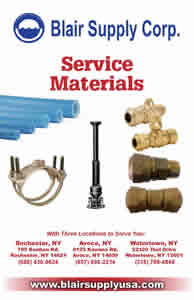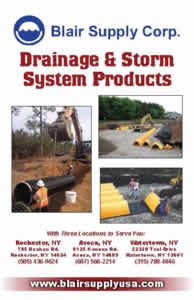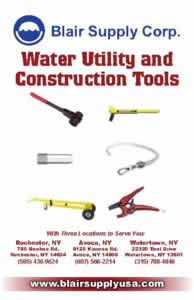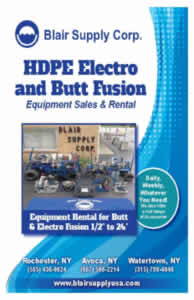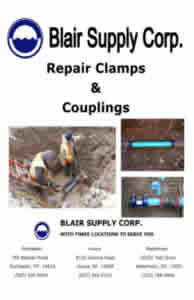Blog
Pipes for Municipal Water Lines: A Brief Overview
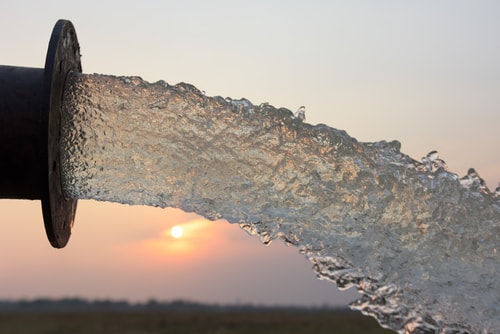
Aged and damaged pipes are a serious issue in municipal water and wastewater systems. This is why it is essential to select piping materials that can endure the right kind of deterioration over the course of their lifespan.
If you are searching for durable utility distribution materials, look no further than Blair Supply Corp. We are a long-standing company serving the water and wastewater industry since 1958 and offering products from the top brands on the market, including Ford repair clamps, and more.
In this article, we will discuss some of the most common pipes used for municipal water systems, shedding light on the material’s weaknesses and strengths, as well as most effective repair procedures. Read on.
What type of pipe do you use for water?
There are several options to choose from when deciding on the right pipe for different municipal water systems. The most common piping materials include:
Ductile iron pipe
Just like its predecessors, the cast iron pipes, ductile iron pipes are known for their exceptional strength. Additionally, the material these pipes are made of is 95% recycled, which makes this one of the few sustainable piping options available on the market.
Unfortunately, ductile iron pipes are quite sensitive to corrosion, especially in acidic conditions present in different sewage and wastewater types. In water distribution systems, this issue can be mitigated by lining the pipe’s interior with cement mortar, as well as using special encasements that protect the pipe from external corrosion. St
Concrete pipe
Concrete is widely used for both pressure and gravity flow piping situations. In the case of gravity-flow pipes, concrete can be shaped in several different ways, including elliptical, round, box, and arched. This concrete pipe variety is typically used for sanitary sewers and storm drains, while the concrete pressure pipe is a common option for potable water.
This piping material is strong, heavy, rigid, and extremely durable. However, concrete does come with its own disadvantages. It is susceptible to hydrogen sulfide and acidic corrosion, which means that special liners and other measures have to be used when the pipe is installed in acidic environments.
Steel pipe
Steel is a common water pipe material known for being highly resistant to internal pressures and surges, which makes it a great option for water and wastewater pressure pipes. Other characteristics of steel include exceptional strength as well as good flow characteristics if the pipe is lined with asphalt to protect it against internal corrosion. Proper installation of steel pipes is necessary if damage to the coating is to be prevented.
HDPE pipe
Thanks to its flexibility and non-corrosive characteristics, high-density polyethylene is one of the most popular piping materials used in the water and wastewater industry. Another perk of using HDPE pipes is that they exhibit no water loss owing to their heat-fused joints.
Since HDPE pipes are known for their ductility and flexibility, they are a great choice for high seismic areas, where earthquakes are a constant risk. These pipes come in a wide range of sizes (1/2 up to 65 inches), which makes them a suitable option for everything from distribution mains to service lines.
PVC pipe
PVC, or polyvinyl chloride has been used since the 19th century for a wide range of applications, including wiring insulation on military ships. PVC is one of the most popular piping options for potable water distribution and sanitary sewers.
PVC is a thermosoftening plastic, which means that it is highly malleable and pliable at the right temperatures. This material is also highly resistant to corrosion. In fact, it is commonly used to protect other, less corrosion resistant materials in acidic environments. What’s more, PVC pipes are also resistant to gasoline, which is one of the main causes of hydrocarbon pollution.
What is the best pipe to use for an underground water line?
 There is no single piping material that will be suitable for every application in the water and wastewater industry. While plastic pipes such as PVC and HDPE do have some significant advantages over their metal counterparts, there still are cases where a sturdy concrete pipe would be a better choice. And since different site conditions and climate can affect the performance of the pipe throughout its lifespan, thorough inspection and planning are key when deciding on the right piping material for the project.
There is no single piping material that will be suitable for every application in the water and wastewater industry. While plastic pipes such as PVC and HDPE do have some significant advantages over their metal counterparts, there still are cases where a sturdy concrete pipe would be a better choice. And since different site conditions and climate can affect the performance of the pipe throughout its lifespan, thorough inspection and planning are key when deciding on the right piping material for the project.
We bring you top-quality Ford repair clamps and much more
Blair Supply Corp. is a reputable provider of utility distribution materials serving the State of New York and the rest of the country. At our warehouses in Rochester, Watertown, and Avoca, we carry a wide array of products from the leading manufacturers in the industry, offering everything you may need for municipal water and wastewater supply projects, including durable repair clamps, couplings, and a wide range of piping materials. Reach out to us and enjoy our great customer service and nationwide shipping. Contact us today!

